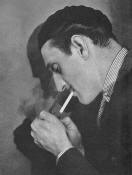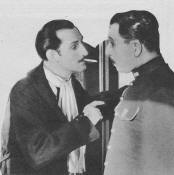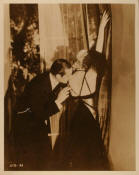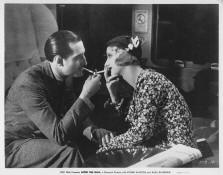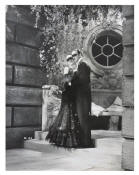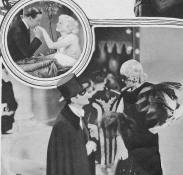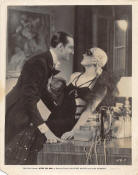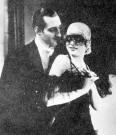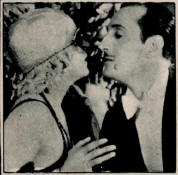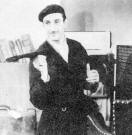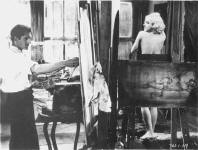After the Ball(1932) 70 min. b&w
The story begins with a conference of the League of Nations taking place in Geneva, Switzerland. The British minister awaits the arrival of a King's courier with important dispatches, one Jack Harrowby (played by Rathbone), who is en route by train. Jack is delayed, however, by being in the wrong part of the train. He has been dallying with a woman, with the result that the railway coach containing his luggage has been detached for Geneva, while the section of train containing his lady friend's compartment is bound for Aix. Clad only in dressing gown and pajamas, he awakens to a sense of responsibility. A train attendant, used to such affairs, fits him out with a suit of chessboard checks, and Jack awaits the train's first stop, in order that he may get to Geneva. Back in Geneva, Peter Strange, a diplomat, is greeting his wife good morning. Elissa Strange, although deeply in love with her husband, is vexed that her husband cannot take her to the masked ball that evening. Elissa decides to go anyway, and arranges to be chaperoned by her maid, Victorine. Eventually arriving at Geneva that evening, Jack attends the masked ball, where he encounters Peter's wife Elissa. He doesn't know who she is, but while dancing with her, he makes love to her. She refuses to unmask, and when she leaves, Jack pursues her to her home, where she still refuses. Presently she leaves the room on some pretext and returning still masked appears to be of a more coming-on disposition, to the extent of permitting him to kiss a mole on her shoulder-blade, in which delicate employ he is interrupted by Peter, who is just arriving home. Escaping by the balcony Jack leaves on the branches of a tree a handbag belonging to the wife of the Minister for Albuera and containing the seal which that Minister needed to sign a Treaty. The Minister's wife had stolen the seal to prevent her husband signing the pact the night of the ball, so that he could take her to the affair. She dropped the bag at the ball and Jack picked it up. Whether he thought it was Elissa's bag, or whether he knew it was the minister's wife's bag and intended to return it, he had it with him when he followed Elissa Strange home. There is a hullabaloo the next day when the Minister cannot find his seal, and Jack is sent to look for it. Jack is invited to begin his search with cocktails at Peter's house where he recognizes some of the furniture and there is something about his hostess which is familiar as well. In the meantime he has boasted of his conquest to Peter, who now discovers the whole thing and charges Elissa with unfaithfulness. In this Peter is wrong, for Elissa had switched clothes and mask with her maid Vicky, whose mole it was that infatuated Jack. The deception fooled Jack, and a scandal is averted. All ends well. Plot summary adapted from The Tatler (December 7, 1932) and the Souvenir Programme.
After the Ball, produced at the Gaumont-British Studios, was released in the United Kingdom in December 1932. It wasn't released in the USA until March 1933. Fox handled distribution in the USA. Located in Lime Grove, Shepherd's Bush (West London), the Gaumont-British Studios had been enlarged and rebuilt with a glass roof, and reopened in June 1932. After the Ball was the second production from the new studio, the first being Rome Express. Three stages were used for this film. The largest one was for the ballroom. On another Basil Rathbone flirted with the stenographers at the League of Nations Council Chamber. The third stage was Esther Ralston's flat. In addition, the British Government building at Wembley was brought into service as the exterior of the Conference Hall.
Wendy Hiller, who in 1947 starred with Basil Rathbone on Broadway in The Heiress, appeared as an extra in After the Ball. In an article for Photoplay she recalled, "Esther Ralston and Basil Rathbone were the stars. Once, going up the stairs, I saw Mr. Rathbone coming down. He passed so close to me that I could have touched him by putting out my hand and I nearly swooned from excitement." (from "Girl with the 'Immoral' Hair" by Margaret Chute, Photoplay, June 1941) After the Ball features two musical numbers: "A WaltzA NightA Tune" and "In Santa Lucia." At the present time After the Ball is not available on DVD or any other viewing format. We can only hope that the film is not lost forever, and that a copy of it will be found and restored.
"After the Ball is a British film which knocks many an American production cold. All the Hollywood glamour is there, all the comedy, and all the romance which were at one time supposed to be their monopoly." The Yorkshire Evening Post, December 3, 1932 "I cannot remember when the gifts of Esther Ralston and Basil Rathbone have been so well displayed as in 'After the Ball.' In no Hollywood film have they done so well." Sun. Graphic, December 7, 1932 "This delectable entertainment is the second talking picture to come from the new Gaumont-British Studios. The action flows swiftly, the dialogue is witty, the music is tuneful, the settings are charming, and the acting is delightful." Daily Mail, December 7, 1932 "Lavishly produced as well as brilliantly acted ... entirely delightful, gay, elegant, and sparkling comedy." Sunday Referee, December 7, 1932
"A particularly well-selected and competent cast act brilliantly in this satirical romance, bringing vivacity and a wealth of talent to the unfolding of the scintillating plot. ... Gaumonts claim that 'After the Ball' fills all the essentials of a worthwhile picture. It has a story rippling with humorous situations, adequate acting, magnificent sets, excellent photography, and good recording. It is a first-class entertainment, the whole production marking a high standard." The Era, November 23, 1932 "After the Ball is a light and cheerful thing containing a pleasant fox-trot. It has been very well done, and for entertainment, pure and simple, is well worth seeing." F. G. Stowe, Coventry Evening Telegraph, December 1, 1932 "Brilliant acting combined with the humorous dialogue, leaves an impression of the gaiety and charm which the entire picture has." Reynolds's News, December 7, 1932 "This sophisticated remake of the German bedroom farce OPERA BALL has Rathbone becoming involved in an affair with a diplomat's wife. Or is it with the maid? Lush and pretty, with a handsome cast, the film has a definite, albeit simple charm." TV Guide Movie Database
"A naughty-naughty English musical, based on a previously used German farce. Basil Rathbone, intrigued by Esther Ralston at a masked ball, follows her home. But Esther crosses him by substituting her masked maid for herself, and Basil doesn't tumble. Well mounted, with some good music; but it simply can't get the proper farce tempo." Photoplay, June 1933 "In 'After the Ball,' ... the British translate the froth, sparkle and airy grace of a Viennese musical theme in terms of lumbering farce comedy. The story, which should have been no more than the trellis-work, is very nearly everything, and the director has not had the ingenuity to decorate it beyond the bare outline. Although Esther Ralston has never seemed lovelier and Basil Rathbone is a model of amorous gallantry, 'After the Ball' is a dull picture." A. D. S., New York Times, March 20, 1933 "Milton Rosmer has turned out a polished and amusing production losing pace occasionally, but full of movement in a finely staged Bal Masque. Basil Rathbone's gay Lothario finds a charming partner in Esther Ralston's romantic young wife, and Clifford Heatherley's pompous minor delegate is a gem of comic characterisation." Michael Orme, The Sketch, November 30, 1932 "After the Ball seems to me the happiest sign of the new era of British films. It is a lightsome thing, distinguished by some delightful acting and very fine photography and art direction." Evening News, December 7, 1932
"Brilliantly produced by Milton Rosmer, and smartly acted by a first-rate company, its situations and dialogue are so entertaining as to hold attention from first to last." Sunday Times, December 7, 1932 "After the Ball should amuse any one who has a sense of humor ... Basil Rathbone, British actor and the centrifugal force of this comedy-drama, turns in an excellent performance." Evening Star (Washington DC), May 9, 1933 "A triumph of British achievement. Delicious light entertainment." The Cinema, December 7, 1932 "'After the Ball' is a wonderfully attractive film ... It is a somewhat saucy comedy. ... Milton Rosmer has given us a rare example of how to treat sophisticated comedy with good taste." Sunday Pictorial, December 7, 1932 See Page Two for pictures of posters, lobby cards and promo photos. .
|







